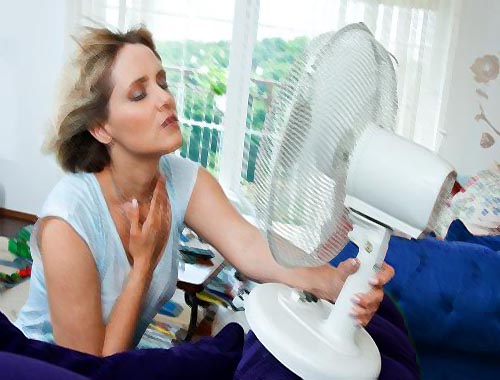Menopause

Published: 18 Jun 2025
ICD9: 627.2 ICD10: N95.1 ICD11: GA30
Menopause is a natural biological process that marks the end of a woman's menstrual cycles.
It's officially diagnosed when a woman has gone 12 consecutive months without a menstrual period.
Here's a more detailed breakdown:
![]() What happens: During menopause, the ovaries gradually produce less estrogen and progesterone, the hormones that regulate menstruation. This decline in hormone levels leads to various physical and emotional changes.
What happens: During menopause, the ovaries gradually produce less estrogen and progesterone, the hormones that regulate menstruation. This decline in hormone levels leads to various physical and emotional changes.
![]() When it happens: The average age of menopause is 51, but it can occur anytime in a woman's 40s or 50s. Early menopause can also happen due to medical conditions or treatments.
When it happens: The average age of menopause is 51, but it can occur anytime in a woman's 40s or 50s. Early menopause can also happen due to medical conditions or treatments.
![]() Symptoms: The symptoms of menopause can vary widely from woman to woman. Some common symptoms include:
Symptoms: The symptoms of menopause can vary widely from woman to woman. Some common symptoms include:![]()

![]() Irregular periods: Changes in the frequency, length, and flow of menstrual periods are often the first sign of perimenopause (the transition period leading up to menopause).
Irregular periods: Changes in the frequency, length, and flow of menstrual periods are often the first sign of perimenopause (the transition period leading up to menopause).![]()

![]() Hot flashes: A sudden feeling of intense heat, often accompanied by sweating and redness of the skin.
Hot flashes: A sudden feeling of intense heat, often accompanied by sweating and redness of the skin.![]()

![]() Night sweats: Hot flashes that occur during sleep.
Night sweats: Hot flashes that occur during sleep.![]()

![]() Sleep disturbances: Difficulty falling asleep or staying asleep.
Sleep disturbances: Difficulty falling asleep or staying asleep.![]()

![]() Mood changes: Irritability, anxiety, depression, and mood swings.
Mood changes: Irritability, anxiety, depression, and mood swings.![]()

![]() Vaginal dryness: Decreased lubrication can cause discomfort during intercourse.
Vaginal dryness: Decreased lubrication can cause discomfort during intercourse.![]()

![]() Urinary problems: Increased frequency or urgency of urination.
Urinary problems: Increased frequency or urgency of urination.![]()

![]() Decreased libido: Reduced sexual desire.
Decreased libido: Reduced sexual desire.![]()

![]() Weight gain and slowed metabolism: Changes in body composition.
Weight gain and slowed metabolism: Changes in body composition.![]()

![]() Thinning hair and dry skin: Hormonal changes can affect hair and skin.
Thinning hair and dry skin: Hormonal changes can affect hair and skin.![]()

![]() Changes in cholesterol levels: Increased risk of heart disease.
Changes in cholesterol levels: Increased risk of heart disease.![]()

![]() Bone loss: Increased risk of osteoporosis.
Bone loss: Increased risk of osteoporosis.
![]() Stages:
Stages:![]()

![]() Perimenopause: The transition period leading up to menopause. It can last for several years and is characterized by irregular periods and other menopausal symptoms.
Perimenopause: The transition period leading up to menopause. It can last for several years and is characterized by irregular periods and other menopausal symptoms.![]()

![]() Menopause: The point when a woman has gone 12 consecutive months without a period.
Menopause: The point when a woman has gone 12 consecutive months without a period.![]()

![]() Postmenopause: The years following menopause. While some symptoms may subside, the risk of certain health conditions, such as heart disease and osteoporosis, increases.
Postmenopause: The years following menopause. While some symptoms may subside, the risk of certain health conditions, such as heart disease and osteoporosis, increases.
![]() Treatment: While menopause is a natural process and doesn't necessarily require treatment, there are options available to manage bothersome symptoms. These include:
Treatment: While menopause is a natural process and doesn't necessarily require treatment, there are options available to manage bothersome symptoms. These include:![]()

![]() Hormone therapy (HT): Estrogen and/or progesterone replacement can alleviate hot flashes, vaginal dryness, and other symptoms. It's important to discuss the risks and benefits of HT with a healthcare provider.
Hormone therapy (HT): Estrogen and/or progesterone replacement can alleviate hot flashes, vaginal dryness, and other symptoms. It's important to discuss the risks and benefits of HT with a healthcare provider.![]()

![]() Non-hormonal medications: Antidepressants, gabapentin, and other medications can help manage hot flashes and mood changes.
Non-hormonal medications: Antidepressants, gabapentin, and other medications can help manage hot flashes and mood changes.![]()

![]() Lifestyle changes: Maintaining a healthy diet, exercising regularly, getting enough sleep, and managing stress can help alleviate symptoms.
Lifestyle changes: Maintaining a healthy diet, exercising regularly, getting enough sleep, and managing stress can help alleviate symptoms.![]()

![]() Vaginal lubricants and moisturizers: Can help alleviate vaginal dryness.
Vaginal lubricants and moisturizers: Can help alleviate vaginal dryness.
Important Considerations:
![]() Consult a doctor: It's essential to talk to a doctor about any concerns or symptoms related to menopause. They can help determine the cause of your symptoms and recommend the best course of treatment.
Consult a doctor: It's essential to talk to a doctor about any concerns or symptoms related to menopause. They can help determine the cause of your symptoms and recommend the best course of treatment.
![]() Individualized approach: Treatment for menopause should be tailored to the individual woman's needs and preferences.
Individualized approach: Treatment for menopause should be tailored to the individual woman's needs and preferences.
![]() Long-term health: Maintaining a healthy lifestyle is crucial for managing long-term health risks associated with menopause, such as heart disease and osteoporosis.
Long-term health: Maintaining a healthy lifestyle is crucial for managing long-term health risks associated with menopause, such as heart disease and osteoporosis.
In summary, menopause is a normal part of aging for women, but it can bring about a range of physical and emotional changes. Understanding what to expect and working with a healthcare provider can help women navigate this transition comfortably and maintain their health and well-being.